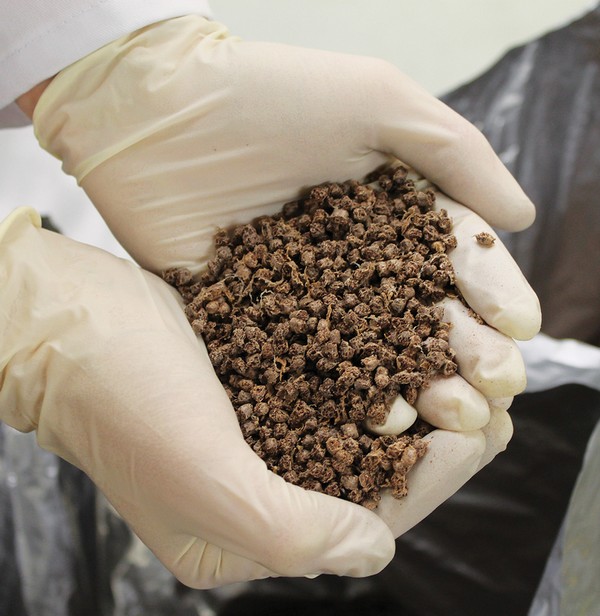Zespri's biospife ready for market

‘Masterbatch’ developed by Scion, in Rotorua.
Taking a product from the laboratory to market is a challenging process. But after a long journey, the biobased and industrially compostable version of Zespri’s iconic spoon-knife, the biospife, is now ready for use. Following many rounds of testing and development, Zespri has 150,000 biospifes ready for kiwifruit lovers all over the world to cut, scoop and compost.
Commercialisation: a whole new ball game
Innovative projects can bring a wide variety of challenges from the chemical level right through to manufacturing and regulatory considerations. The biospife was no exception. Kiwifruit residue is a wet biomaterial that is rarely included in the kind of hot plastic manufacturing used to create spifes. This created unforeseen challenges for the team.
Scion research leader Dr Dawn Smith oversaw the final steps that brought the biospife to a commercial scale. “We created an array of different looking prototype biospifes for Zespri to choose from. But we still had to ensure their chosen spife could be made outside the lab, using the manufacturing equipment available, and that was one of the biggest challenges.”
Project leader Gildas Lebrun and the rest of the team settled on a process called masterbatching. The team developed a ‘masterbatch’ mixture that acts like a concentrate. The concentrated kiwifruit mixture is then added to a compostable bioplastic before being injected into the spife moulds. Getting the mix right was key to making sure the biospife would have the right qualities and meet food safety standards.
Late last year, the masterbatch mixture was sent to plastic manufacturer, Alto, for a trial run. Dawn says, “It went so smoothly we were in shock. Anyone who’s been involved in bioplastics processing knows that is rare.”
Alto’s Engineering Services Manager, Paul Clemence says, “Here at Alto Packaging Limited we are passionate about developing innovative and sustainable products. This is often a difficult process, but when all parties involved have a similar philosophy and are determined to succeed, it makes the challenges a lot easier to overcome. This project was a good example of that.”
Taking kiwifruit one more step
The biospife is a ‘kiwi’ project in many ways. The kiwifruit skins in the biospife are a side product from puree processing in Te Puke, and were shipped to Scion’s Rotorua campus to be turned into masterbatch. After being added to the bioplastic by Alto in Christchurch, the finished biospifes were sent to Zespri’s headquarters in Mount Maunganui. From there, Zespri takes the biospife to the world, sending them to any of the 53 countries they sell kiwifruit to.
As a biomass side stream of kiwifruit horticulture, kiwifruit skins are either sold as animal food or composted. Dawn says, “Adding kiwifruit to the biospifes creates another use for the by-product before it’s composted. The kiwifruit component also gives the biospife an organic look, differentiating it from the polystyrene spife”.
Zespri’s commitment key to success
Zespri’s drive to be more sustainable led to the initiation of this project and the company’s commitment ensured that it endured the many challenges that come with product innovation.
Dawn says, “It has been a long journey to get the biospife to commercialisation, and Zespri’s commitment has been vital to our success. Working with a company keen to improve its sustainability performance was a great experience”.
Zespri’s Alice Moore, Global Marketing Manager for Organics, says, “Scion and Alto’s innovative work has created an excellent, more environmentally-friendly product.
“It is great to be able to offer an alternative bio-degradeable spife and we’re looking forward to engaging consumers and telling them about the science behind it when they cut, scoop and eat our kiwifruit”.
